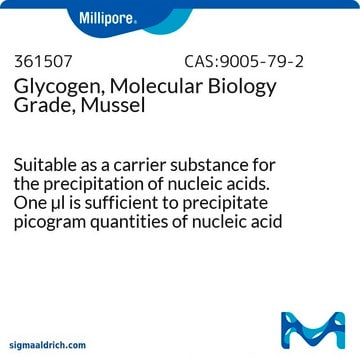G1508
Glycogen from mussel, Mytilus genus
≥85% anhydrous basis (enzymatic)
About This Item
Recommended Products
biological source
(Mytilus genus)
Assay
≥85% anhydrous basis (enzymatic)
form
powder
impurities
≤1% Protein (Lowry)
color
white to off-white
storage temp.
2-8°C
InChI
1S/C24H42O21/c25-1-5-9(28)11(30)16(35)22(41-5)39-4-8-20(45-23-17(36)12(31)10(29)6(2-26)42-23)14(33)18(37)24(43-8)44-19-7(3-27)40-21(38)15(34)13(19)32/h5-38H,1-4H2/t5-,6-,7-,8-,9-,10-,11+,12+,13-,14-,15-,16-,17-,18-,19-,20-,21+,22+,23-,24-/m1/s1
InChI key
BYSGBSNPRWKUQH-UJDJLXLFSA-N
Looking for similar products? Visit Product Comparison Guide
General description
Application
Preparation Note
Other Notes
Storage Class Code
11 - Combustible Solids
WGK
WGK 3
Flash Point(F)
Not applicable
Flash Point(C)
Not applicable
Personal Protective Equipment
Certificates of Analysis (COA)
Search for Certificates of Analysis (COA) by entering the products Lot/Batch Number. Lot and Batch Numbers can be found on a product’s label following the words ‘Lot’ or ‘Batch’.
Already Own This Product?
Find documentation for the products that you have recently purchased in the Document Library.
Our team of scientists has experience in all areas of research including Life Science, Material Science, Chemical Synthesis, Chromatography, Analytical and many others.
Contact Technical Service







